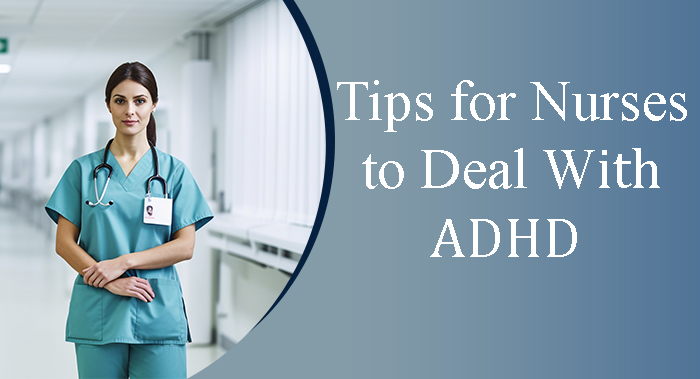
Tips for Nurses to Deal With ADHD
Nursing is such a challenging profession, and living with ADHD makes it more struggling. This profession requires extraordinary skills such as attention to detail, well-planning, and focus. Nurses with ADHD struggle to have these skills, but does it obstruct their success? Not sure? Let's move ahead and uncover the answer in this article!
What is ADHD?
ADHD stands for Attention Deficit Hyperactivity Disorder, which affects both men and women in different ways. It generally poses a change in people's thinking and behavior. The symptoms of ADHD may differ from person to person, and according to CDC (Centers for Disease Control and Prevention) categorized this into three categories that are as follows:
- Predominantly Inattentive Presentation
It's a kind of neurobehavioral disorder in which a person faces difficulty in sustaining attention and completing work in an organized way. Some of the characteristics are procrastination, forgetfulness, distraction, and hesitation.
- Predominantly Hyperactive-Impulsive Presentation
In this type of ADHD, it's hard for a person to sit in one's head as they feel impulsive and restless. They fidget and speak a lot at any time without listening to others. They have more chances of accidents and injuries compared to others.
- Combined Presentation
People having this type of ADHD has symptoms of both predominantly inattentive and predominantly hyperactive-impulsive presentation.
ADHD in Nurses: Success or Failure?
People often ask if they can be a nurse with ADHD, and the simple answer is Yes! As we discussed above, ADHD is just a neurodevelopment disorder that can't restrict one from doing their job. Indeed, people are facing severe issues in performing their nursing job with ADHD, but with certain tips, they can manage it efficiently. However, several studies show that people have improved ADHD traits and succeed in their fields.
Thriving as a nurse or nursing student with ADHD requires proactive strategies and self-care techniques. First, create a structured routine that includes dedicated study and work periods, ensuring time for breaks and relaxation. Utilize visual aids like color-coded calendars and to-do lists to enhance organization and task prioritization. Active communication with professors and colleagues is crucial; inform them about your ADHD and request support when needed.
Along with this, implement effective note-taking strategies, such as using abbreviations and highlighting key points. Utilize technology tools like smartphone apps for reminders and organization. Regular exercise and a balanced diet promote focus and overall well-being. Utilize relaxation techniques like deep breathing and mindfulness to manage stress. Seek support networks, either online or in-person, to connect with others facing similar challenges. Most important, be kind to yourself and embrace self-compassion, recognizing that ADHD is not a limitation but a unique aspect of your journey as a nurse.
10 Effective Tips for Nurses with ADHD
Combining therapy techniques, meditation, and some lifestyle changes show that nursing professionals can improve ADHD traits and excel in their careers. Implementation of the right strategies can help nurses with ADHD maintain focus, enhance productivity, and find balance in their demanding profession.
1. Follow a Routine
Creating a consistent daily routine can help you stay organized and focused. Set specific times for tasks such as charting, medication administration, and patient assessments. Prioritize your responsibilities and create a to-do list to stay on track. Remember, lists are your best friend, so daily, make a list and follow it accordingly.
2. Utilize Visual Aids and Reminders
Visual aids, such as color-coded calendars, sticky notes, flashcards, and alarms, can serve as helpful reminders for important tasks and deadlines. Nurses with ADHD are commonly facing forgetness issues, so this tip will help you engage your brain in learning and reminding. Use a whiteboard or a planner to visualize your schedule and keep track of upcoming appointments, meetings, and shifts.
3. Start From Small
Forgetfulness is a common trait in nurses with ADHD; thus, paying attention to every small thing is essential. Large, complex tasks can feel overwhelming for individuals with ADHD. If you have something complex to do, break it down and take small steps to make the task more manageable. By focusing on one step at a time, you can maintain clarity and reduce stress.
4. Work in a Quiet and Organized Environment
Nurses with ADHD find more difficulty in concentration as they easily get distracted by small things. A clutter-free and peaceful work environment can significantly improve your focus and productivity. Ensure your workspace is clean and free from distractions so that you can accomplish your goals fast. Use folders, labels, and digital tools to organize patient information and documents. It will organize your tasks and make them more precise.
5. Use Pomodoro Technique
People with ADHD experience short attention spans, and the Pomodoro technique is such a useful strategy that you can try to manage your time. Taking short breaks throughout your shift can help prevent mental fatigue and improve concentration. Using this technique, identify your primary task and set a timer for 25 minutes. Work on the task without distraction, and after 25 minutes, take a 5 minutes break and repeat the same three times. After that, take a longer break of 30 minutes and restart the task. It improves concentration levels as it's an effective time management tool.
6. Utilize Supportive Tools and Apps
Having ADHD makes your life quite challenging, and it's the advanced technology that eases the ADHD traits. Move with the digital world as several digital tools and apps can aid in managing ADHD symptoms. Consider using productivity apps, time trackers, and noise-canceling headphones to minimize distractions and enhance focus during your work hours.
7. Communication is the Key
As a nurse with ADHD, you will oftentimes find difficulty communicating with people. Hence, sharing your experience with your loved ones or close ones will minimize potential communication difficulties. Moreover, inform your colleagues and supervisors about your ADHD. You can foster a supportive and understanding work environment by sharing your challenges and needs.
8. Practice Self-Care
Prioritize self-care to maintain your overall well-being. Engage in activities that help you relax and recharge outside of work, such as exercise, hobbies, meditation, or spending time with loved ones. Taking care of yourself will enhance your ability to manage ADHD symptoms effectively.
9. Seek Professional Support
Consider consulting with a healthcare professional who specializes in ADHD if you are feeling stressed and depressed. They can provide guidance, offer coping strategies, and explore medication options if necessary. Therapy sessions can also help you develop techniques to manage stress and improve focus.
10. Keep Your Mind Free and Happy
If you're dealing with ADHD, using this coping strategy is crucial. Whenever something pops into your mind, take it down on a notepad, and it'll clear your mind. Furthermore, acknowledge and celebrate your successes, no matter how small they may seem. Positive reinforcement can boost your self-esteem and motivate you to continue overcoming challenges. Take pride in your accomplishments as a nurse with ADHD, knowing that you are making a significant impact on the lives of your patients.
EndNote
ADHD is a problem related to a person's attention and concentration that can be treated with effective strategies. However, nurses with ADHD faces several unique challenges that adversely impact their career. The top ten tips are concluded in this article that can help nurse professionals keep their careers on track. With these effective techniques, along with the nursing webinars, nurses can thrive in their profession and achieve success despite ADHD symptoms. However, there are a variety of topics on which nurses need to be updated, and it can only be possible through interactive webinars.






This informative piece helps me to write a proper checklist for ADHD.